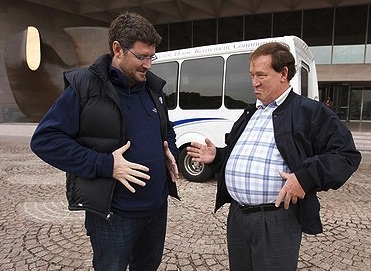 Fat, Sick and Nearly Dead seems like a combination of things. It begins as the personal journey of Joe Cross, the filmmaker, to a healthier life. He also mixes in some education on nutrition. And the films ends with an inspirational moment and an invitation to change our bad eating habits.
Fat, Sick and Nearly Dead seems like a combination of things. It begins as the personal journey of Joe Cross, the filmmaker, to a healthier life. He also mixes in some education on nutrition. And the films ends with an inspirational moment and an invitation to change our bad eating habits.
Stories of personal journeys usually are most powerful when there’s a strong, narrative arc: desperate man, living on the street becomes millionaire philanthropist. Or: famous, successful celebrity gets addicted to drugs succumbs to an overdose. Joe Cross isn’t a guy who naturally fits either mold. He’s a rich businessman who overindulged, grew a big gut, developed an autoimmune disease, and took a lot of steroids to combat the disease. He then decides to clean up his act.
Though his situation does appear to be rather desperate, and even though he’s clearly a very likeable Australian bloke, it’s hard to get too emotionally invested in his quest. His weight problem, afterall, is basically the result of gluttony, and he suspects that his disease is exacerbated by his overindulgence. As part of his resolution to change his ways, he comes to America and goes on a 60-day fast, consuming fruit and vegetable juices only. At the same time, he hangs out in New York for a month and interviews all sorts of people about their eating habits. He then drives across the U.S. and speaks with more people.
His conversations are revealing. Most of us, to varying degrees, behave in ways that, we know, are unhealthy. But it’s a bit startling to hear so many people say without hesitation that they are comfortable with the status quo, even if it means sacrificing a few years of their life. Along with his conversations, Cross inserts commentary and explanations from nutritionists on the dangers of eating lots of fatty foods and sugar – all stuff that nearly all of us already know but probably choose to ignore.
The film almost instantly becomes exponentially more engaging when Joe, it appears, happens to meet Phil by total chance. Phil is a trucker who is in worse condition than Joe, so overweight he can’t walk for more than five minutes and also suffering from the same autoimmune disease. Joe offers his help, which Phil eventually accepts. Phil gives the film the narrative arc. He is a supremely sweet guy, he’s suffered a bit of bad luck, he comes from a less privileged background, and his situation is considerably more dire than Joe’s. In other words, he’s a very easy character to root for.
It’s at this point where the inspirational moments kick in – see Phil fast on vegetable drinks, see him begin to exercise, hope that he can slim down so that his son can once again be proud of him, hope that he can slim down so that he can avoid an early grave. Watching his quest is enough to motivate a person to get themselves a juicer, eliminate the junk food, and extend their life a few years.